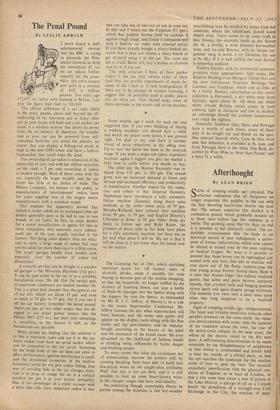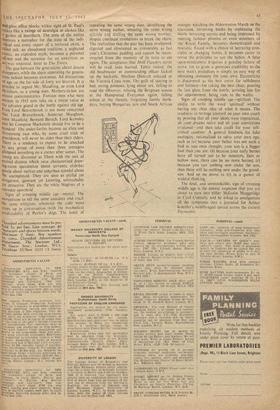Afterthought
By ALAN BRIEN
SIGNS of creeping middle age—physical. The reluctant realisation that all hangovers no longer evaporate like puddles in-the sun with the first warming lunch-time snorter the next day. The uneasy suspicion that alcohol is a cumulative poison which gradually mounts up in those once hollow legs like sediment in a bottle. The growing sense that for days on end it is possible to feel distinctly corked. The un- deniable consciousness that the body is an historical record of past indulgences, a palim- psest of former indiscretions, which now cannot be altered or erased even by the most cunning of medical forgers. No more is it possible to pretend that those brows can be reploughed and seeded with new hair, that diet or exercise will ever carve out of the fleshy mummy-case the slim young prince forever buried there. Now it is seen that bruises linger like tedious weekend guests, that aches and pains become statutory tenants, that crooked nails and bulging bunions return again and again despite savage evictions The essential you owns only a short lease upon what was long imagined to be a freehold property.
Signs of creeping middle age—temperamental The fussy and irritable sensitivity towards other people's presence on the same earth. An obses sive preoccupation with noise; with the yammer of the transistor across the river, the roar of the motor-cycle exhaust in the next street, the whine of the electric mixer in the flat next door. A self-torturing determination to be made miserable by the thoughtlessness of neighbours so that silence is commanded and breath held to hear the rumble of a distant party, so that the eye searches the landscape for the smallest scrap of litter to spoil the view. The mystical empathetic identification with the physical con dition of England, or at least of London, so that a tiny news item about a row of pylons in the Lake District, a splurge of oil on a Cornish beach, the demolition of a wrought-iron Coal Exchange in the City, the erection of steel
and-glass office blocks within sight of St. Paul's strikes like a twinge of neuralgia or chokes like a gusher of heartburn. The state of the nation becomes a metaphor for the state of the indi- vidual and every report of a tortured swan, a Iclied oak, an abandoned tradition, a neglected classic, an exploded myth, becomes a personal adront and the occasion for an unwritten, or anyway unposted. letter to The Times. The gap between the generations ahead almost appears, while the abyss separating the genera- tions behind becomes enormous. All distinctions i 01 age on the far side of forty are blurred. It is Possible to regard Mr. Maudling, or even Lord Hailsham, as a young man. Mothers-in-law are almost contemporaries. Famous men who were itncient in 1945 now take on a totem value as Ille advance guard in the battle against old age. lven Lord Beaverbrook is not more concerned IIla! lord Bcaverbrook. Somerset Maugham, John Maselield, Bernard 13aruch, Lord Kernsley and Sir Compton Mackenzie should live to be a hundred lhe under-forties become an alien and Ihreatenung race who, by some cruel trick of Providence, will never be older than their elders. There is a tendency to, expect to be attacked by any group of more than three teenagers glimpsed mooching on a corner after sunset. The Young are discussed as Them with the sort of excited distaste which once characterised draw- ing-room speculation about servants, club-bar gossip about natives and suburban scandal about the unemployed. They are seen as pitiful yet dangerous, ignorant yet knowing, untouchable Yet attractive They are the white Negroes of a Calendar apartheid. Signs of creeping middle age—mental. The compulsion to tell the same anecdote and crack the same witticism, whenever the code word crops up in conversation, with the mechanical Predictability of Pavlov's dogs. The habit of repeating the same wrong -date, identifying the same wrong author, stressing the same wrong syllable and dialling the same wrong number, despite continual resolutions to break the chain. The realisation that the past has been swallowed. digested and eliminated as irrevocably as last year's Christmas pudding and cannot be recon- structed from the memory of its taste to eat, again. The acceptance that Moll Flanders never will be read, judo learned. Tahiti visited. the old headmaster or commanding officer kicked up the backside, Marlene Dietrich 'seduced or the Victoria Cross won. The guilt of staying in bed, eating potatoes, lying about sex, failing to read the Observer, missing the Bergman season at the Hampstead Everyman again, falling asleep at the theatre, forgetting family birth- days. buying Hungarian jam and South African oranges watching the Aldermaston March on the television, revIewing books by rephrasing the blurb. betraying secrets and being impressed by meeting famous phonies or even members of the Royal Family, becomes •domesticated and bearable Faced with a choice of betraying prin.; ciples or changing habits, it becomes easier to revise the principles to suit the habits. A false 'open-mindedness diSguises a genuine failure of nerve, for to gram a generous credibility to the next man's prejudices is simply an easy way of obtaining immunity for your own_ Eccentricity is discovered as the best cover for selfishness and laziness—for taking the best chair, pouring the last glass from the bottle. arriving late for the appointment, being rude to the waiter.
Signs of creeping middle age—spiritual. The ability to write the word 'spiritual' without having any clear idea of what it means. The readiness to revenge yourself on your own youth by proving that all your ideals were impractical, all your dreams naïve and all your convictions irrational—and then take credit for your self- critical candour A general fondness for fake analogies, rationalised to salve your own ego, such as (a) because your father was not such a fool as you once thought. your son is a bigger fool than you are: (b) because your early heroes have all turned out to be monsters, liars or hollow men. there can be no more heroes; (c) because you saw nothing new under the stun, then there will be nothing new under the grand- son. And so on down to (z) in a gamut of wishful thinking.
The final, and unmistakable, sign of creeping middle age is the uneasy suspicion that you are about to turn into either Malcolm Muggeridge or Cyril Connolly and be asked to amalgamate all the symptoms into a jeremiad for Arthur K op stk.' r's middle,aged spread across the current Encounter.



































 Previous page
Previous page